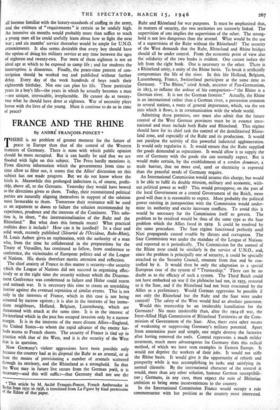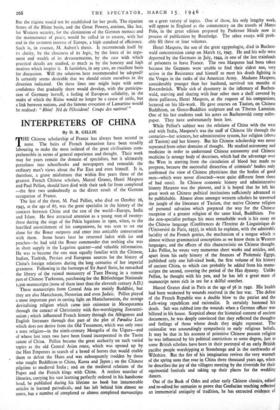FRANCE AND THE RHINE
By ANDRE FRANCOIS-PONCET*
THERE is no problem of greater moment for the future of peace in Europe than that of the control of the Western frontiers of Germany. There is none with which public opinion should be more occupied. But it can hardly be said that we are flooded with light on this subject. The Press hardly mentions it. From discreet information which the governments from time to time allow to filter out, it seems that the Allies' discussion on this subject has not made progress But we do not know where the hitch is. Meanwhile this prolonged indecision is, of course, profit- able, above all, to the Germans. Yesterday they would have bowed to the directions given to them. Today, their reconstituted political parties are naturally aligning themselves in support of the solution most favourable to them. Tomorrow their resistance will be used as an argument to doom to failure the solution recommended by experience, prudence and the interests of the Continent. This solu- tion is, in short, " the internationalisation of the Ruhr and the Rhineland." But what does this formula mean? What practical realities does it include? How can it be justified? In a clear and solid work, recently published (Security de ]'Occident, Ruhr-Rhin), M. Louis Aubert gives an explanation, with the authority of a man who, from the time he collaborated in the preparations for the Treaty of Versailles, has continued to follow, from conference to conference, the vicissitudes of European politics and of the League of Nations. His thesis therefore merits attention and reflection.
The chief anxiety of France in this matter is security—the security which the League of Nations did not succeed in organising effec- tively or at the right time the security without which the Disarma- ment Conference was condemned to failure and Hitler could rearm and unleash war. It is necessary this time to create an unyielding barrier against the eventual repetition of similar events. This is not only in the interests of France, which in this case is not being actuated by narrow egoism ; it is also in the interests of her imme- diate neighbours, Holland, Belgium, Luxembourg, which are threatened with attack at the same time. It is in the interest of Switzerland which in the past has escaped invasion only by a narrow margin. It is in the interests of the more distant Allies—England, the United States—to whom the rapid advance of the enemy for- bade access to French shores. The security of France is tied up in practice with that of the West, and it is the security of the West that is in question.
Now Germany's violent aggressions have been possible only because the country had at its disposal the Ruhr as an arsenal, or at least the means of provisioning a number of arsenals scattered through its territory, and the Rhineland as a stronghold. So that the West may in future live secure from the German peril, it is necessary—and this will suffice—that Germany shall not use the * This article by M. Andre Francois-Poncet, French Ambassador in Berlin from 1931 to 1938, is translated from La Figaro by kind permission of the Editor of that paper.
Ruhr and Rhineland for war purposes. It must be emphasised that, in matters of security, the two territories are narrowly linked. The supervision of one implies the supervision of the other. The strong- hold is not less dangerous than the arsenal. What would be the use
of a supervision of the Ruhr without the Rhineland? The security of the West demands that the Ruhr, Rhineland and Rhine bridges
should all be under control. From the economic point of view also the solidarity of the two banks is evident. One cannot isolate the left from the right bank. One is necessary to the other. There is a Rhineland unity, a unity of the Rhine basin. To break it artificially compromises the life of the river. In this life Holland, Belgium, Luxembourg, France, Switzerland participate at the same time as Germany. " The Rhine," cried Arndt, ancestor of Pan-Germanism, in 1813, to inflame the ardour of his compatriots—" the Rhine is a German river. It is not the German frontier." Actually, the Rhine is an international rather than a German river, a possession common to several nations, a route of general importance, which, via the sea into which it flows, is in communication with the whole world.
Admitting these premises, one must also admit that the future control of the West German provinces must be in essence inter- national and must include both Ruhr and Rhineland. This regime should have for its chief task the control of the demilitarised Rhine- land zone, and especially of the Ruhr and its production. It would not paralyse the activity of this powerful industrial agglomeration.
It would only regularise it. It would ensure that the Ruhr supplied the goods demanded as reparations. It would allow it to supply the
rest of Germany with the goods she can normally expect. But it would make certain, by the establishment of a cordon douanier, a trade barrier, that no more coal, steel or electricity is exported than the peaceful needs of Germany require.
An International Commission would assume this charge, but would it be able to fulfil its double mission, military and economic, with- out political power as well? This would presuppose, on the part of the local Government or a central Government of the Reich, more good will than it is reasonable to expect. More probably the political power existing in juxtaposition with the Commission would under- mine its authority and excite incessant conflicts. To avoid this it would be necessary for the Commission itself to govern. The problem to be resolved would be thus of the same type as the Saar problem which the Allies faced in 1919. It could be resolved by the same procedure. The Saar regime functioned perfectly until Nazi propaganda caused trouble by threats and corruption. The Saar Commission was under the mandate of the League of Nations and reported to it periodically. The Commission for the control of the Rhine zone could be similarly in the service of U.N.O., and, since the problem is principally one of security, it could be specially attached to the Security Council, emanate from that and be con- trolled by it. It would then be only the adaptation to a special European case of the system of " Trusteeship." There can be no doubt as to the efficacy of such a system. The Third Reich could not have embarked on war if the plebiscite had not, in 1935, restored to it the Saar, and if the Rhineland had not been evacuated by the Allies as a preliminary. Would German aggression be possible if not only the Rhineland but the Ruhr and the Saar were under control? The safety of the West would find an absolute guarantee. Would this trusteeship be an intolerable humiliation for the Germans? No more intolerable than, after the 1914-18 war, the Inter-Allied High Commission of Rhineland Territories or the Com- mission of Government of the Saar. Also, there exist other means of weakening or suppressing Germany's military potential. Apart from annexation pure and simple, one might destroy the factories after having removed the tools. Control represents a much milder treatment, much more advantageous for Germany than this radical method, of which we have seen examples in Eastern Europe. It would not deprive the workers of their jobs. It would not stifle the Rhine basin. It would give it the opportunity of rebirth and prosperity while it was accomplishing its tasks and satisfying its normal clientele. By the international character of the control it would, more than any other solution, humour German susceptibili- ties ; Germans, in any case, must expect the ruin of Hitlerian ambition to bring some inconveniences to the country.
In the International Commission France would occupy a role commensurate with her position as the country most interested.
But the regime would not be established for her profit. The riparian States of the Rhine basin, and the Great Powers, anxious, like her, for Western security, for the elimination of the German menace and the maintenance of peace, would be called in to ensure, with her and in the common interest of Europe, a high standard of efficiency. Such is, in essence, M. Aubert's thesis. It recommends itself by i!s clarity, by the closeness of its logic, by the force of its argu- ment and wealth of its documentation, by the care with which practical details are studied, as much as by the honesty and high motives which inspire it. It furnishes, in any case, an excellent basis for discussion. Will the solutions here recommended be adopted? It certainly seems desirable that we should orient ourselves in the direction indicated. On these lines one might hope with some confidence that gradually there would develop, with the participa- tion of Germany herself, a feeling of European solidarity, in the midst of which the Rhine would no longer be a cause of strife, but a link between nations, and the famous evocation of Lamartine would be realised : "Rhin! Nil de l'Occident! Coupe des nations! "



























 Previous page
Previous page